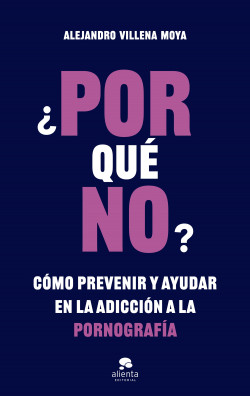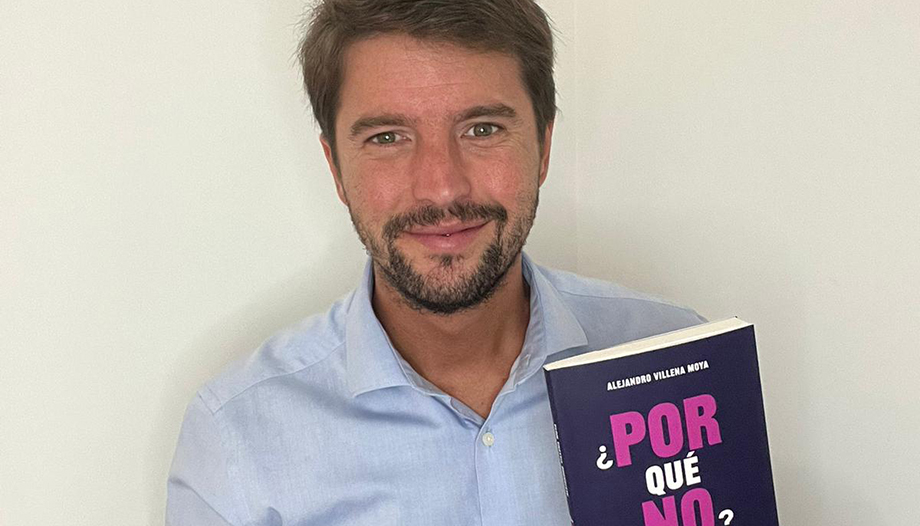"We have a lot of sex education and little affective education," says Alejandro Villena. This psychologist, sexologist and director of clinical and research at the Dale Una Vuelta Association has just published WHY NOT, a book in which he presents his experience and research on the terrible consequences of drug consumption. pornography in personal and sexual relationships.
Villena approaches this complex issue with a strong scientific and practical basis, based on studies and on the cases that Villena himself deals with in consultation and in the talks and workshops he offers, especially in school environments.
Pornography addiction is already a social problem that shows its most evident face in crimes such as gang rapes or the increase of aggressions of this type among young people and children. All this is also driven by the fact that, unlike in the past, it is pornography that seeks the consumer and not the other way around, especially through mobile devices: phones or tablets.
As Villena emphasizes in this interview, "all teenagers carry a small pornographic cinema in their pocket".
When you speak of a pornified society, what do you mean by this term?
- I'm talking about a society that has turned sex into a commodity. Sexuality has become consumed, rather than experienced in a shared way, and it is inundated by this whole culture of pornography that feeds back into society and vice versa.
We are facing a sexuality distant from the affective, distant from the respect for communication and from everything that has to do with human components. A depersonalized sexuality, imprinted with pornographic material.
You make a direct relationship between pornography and violence, where does this relationship come from?
-What the studies tell us is that, the greater the use of the pornographyThe greater tendency to incorporate objectifying beliefs, gender stereotypes where women always lose, where there is no clear vision of communication, respect and consent of women; where women are turned into objects for men and this is a modeling, an imitation of the imaginary that is being built at the level and which is unfortunately based on pornography.
All this is replicated in behaviors with gang rapes, assaults of minors, in which they record it. There are new digital tools and new models that are permeating the way in which adolescents live this sexuality.
Studies confirm that the greater the consumption of pornography, the greater the physical and verbal violence... In addition, pornography consumption affects mirror neurons, which are closely related to empathy and is leading to what Lluis Ballester calls "empathic disconnection"....
In the same media we find interviews with people who praise and encourage the use of pornography for "pleasure" and, at the same time, news of gang rapes. How to deal with such contradictory messages?
-This debate is very striking. Sexuality is a terrain that has been taken over by different ideologies in the face of which questioning any issue of sexuality seems like you are attacking people's freedom.
I think it is a problem, because we have entered into a permissiveness in which anything goes, but then we do not consider whether there are things that are healthy or unhealthy, or good from a clinical point of view, for affective-sexual health.
Wanting pleasure does not mean that all means are good, or that many people do it... I think it is a debate that needs to be put on the table and go beyond the hedonistic discourse of pleasure at all costs, consider the impact it has at a deeper level and come to a serious reflection on the subject.
The question many parents ask themselves is how do I know if my child uses pornography? Above all, can it be prevented or avoided?
-In reality, it is most likely that our children from the age of 10 see pornography or come across it, or accidentally or occasionally access pornographic content. Then there will be a percentage that will continue to consume on a regular basis and become addicted.
It sounds a bit alarming, but that's the way it is.
Any teenager is going to see pornography because we see it in the workshops, in the data, in the consultations..... So, even if it's a little embarrassing, we have to take it for granted that it's going to happen, but not to demonize or think that our children are going to be bad, they're going to be perverts, but to go ahead and give them a good, positive message about sexuality.
It is true that we have signs that give us clues: the time he spends in front of the computer or his dependence on screens, if he goes to private places with his cell phone, if he suddenly has a sexual vocabulary that we do not know where it comes from, if he refers to sexual topics in a objectifying way, etc., etc. All this can be indicative.
In addition, there are others such as sleep disturbance, cognitive performance, change in mood... I think the key is to anticipate, to offer a good model, to talk about healthy sexuality, to differentiate it from pornography and to develop critical thinking so that they can exercise their freedom and responsibility in their affective-sexual life in the future.
Nowadays, the use of cell phones or tablets is widespread among children, do we have the enemy at home?
-Well, yes. Every teenager carries a small porn cinema in their pocket and that needs to change. We have to delay the age at which they start using cell phones as much as possible. When we give it to them, the first device should not have access to the Internet and, later on, we should control and know what they use and why.
We have normalized the use of a cell phone at 9, 10 or 11 years of age and even earlier to calm or soothe a tantrum, and this leads to erroneous learning. This use also prevents the development of cognitive functions in a natural way because we give the brain a super stimulus.
The cell phone -or tablet- is the main entry point for pornography and adults must control and know without overprotecting or censoring.
We have to adapt to the times, giving young people the tools to face the world of the Internet, which is an obstacle course that they will have to overcome.

WHY NOT?
We have had decades of "sex education", but is there a lack of human education and a surplus of mechanical education in this area?
-Yes, that's right. I think the problem is that we have a lot of sex education and little affective education. Affective-sexual education has focused on the latter, on the sexual, the mechanical or the biological, but has forgotten to build people in a solid way.
We have to work on emotions, the world of affection, everything that has to do with sharing, empathy, communication, self-esteem. We have the challenge of creating people with strength, who have a worthwhile project in their lives, who have and cultivate interests, who are creative... etc.
At the end of the day, children and young people must be made to forge a solid identity to face the changing world, which has its challenges in every age. Therefore, we need more education that strengthens the person and less education that reduces the person to a biological issue.








